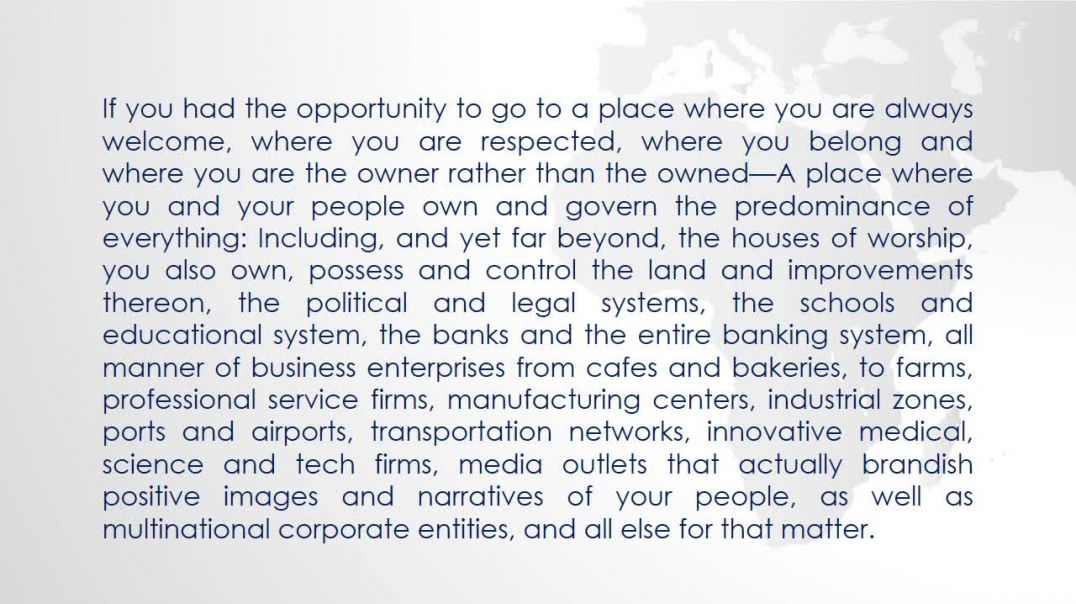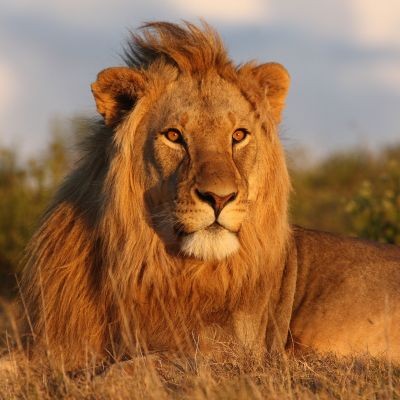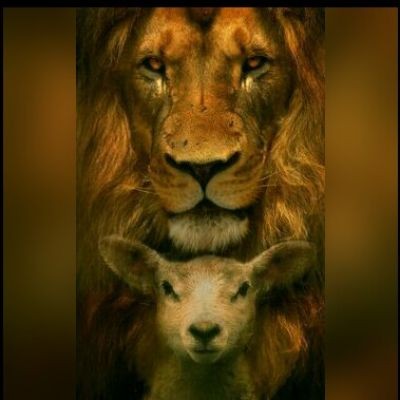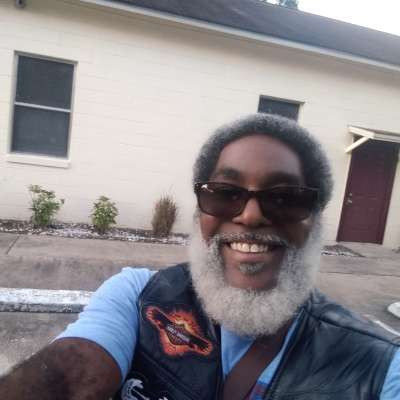חדשות ופוליטיקה

Finally, it is here, the stage has been set "FARus" to advance towards our place of promise.
Immediate African Passport/(Dual) Citizenship/Sovereignty/Autonomy
Economic Freedom, Economic, Trade and Commercial Development
Land and Refuge
Nation Building and Kingdom Building
Visit: https://farus9469264.wordpress.com/
Write to: farus@tutanota.com


This a short clip from a CNN interview in 1988.
Mr. Cokely was an American political researcher and lecturer who lectured nationally on political and economic issues relating especially to the "African American community". For more see link below https://en.wikipedia.org/wiki/Steve_Cokely


Haitians in Chile - the largest migrant community in Latin America - are underpaid and often live in dire conditions.
Many are afraid to seek government and medical help for fear of being deported.
And now, the pandemic is fuelling racism.
Al Jazeera's Lucia Newman reports from Santiago.
- Subscribe to our channel: http://aje.io/AJSubscribe
- Follow us on Twitter: https://twitter.com/AJEnglish
- Find us on Facebook: https://www.facebook.com/aljazeera
- Check our website: https://www.aljazeera.com/
#AlJazeeraEnglish #Chile #Haiti #Coronavirus
![Mother Africa - History of Africa with Zeinab Badawi [Episode 1]](https://i.ytimg.com/vi/ETnIsBnNRr0/maxresdefault.jpg)

In this first episode, Zeinab Badawi travels across the continent examining the origins of humankind; how and why we evolved in Africa - Africa is the greatest exporter of all time: every human being originated in Africa.
During her journey Zeinab is granted rare access to the actual bones of one of the most iconic discoveries in the field of palaeontology, ‘Lucy' in Ethiopia, or as she is known in Amharic, ‘Dinkenesh’, which means ‘you are marvellous’.
Zeinab also spends time in Tanzania with a tribe that is unique in the world because they live in the way our ancestors did, as hunters of big animals and gatherers. This community who have rarely been filmed provide a fascinating insight into how we have lived for most of our history.
Subscribe: http://bit.ly/subscribetoafrica
Website: https://www.bbc.com/africa
Facebook: https://www.facebook.com/bbcnewsafrica/
Twitter: https://www.twitter.com/bbcafrica/
Instagram: https://www.instagram.com/bbcafrica/


Domestic workers play a key role in many households across the continent.
They are often invisible yet indispensable. Lynette is a Zimbabwean mother of three, she gave the BBC's Focus on Africa radio a rare insight into the inner life of a domestic worker.
Illustrations: George Wafula
Producers: Kim Chakanetsa and Gloria Achieng
Subscribe: http://bit.ly/subscribetoafrica
Website: https://www.bbc.com/africa
Facebook: https://www.facebook.com/bbcnewsafrica/
Twitter: https://www.twitter.com/bbcafrica/
Instagram: https://www.instagram.com/bbcafrica/


There have been numerous attacks in Mali in recent months, some ethnically driven, some carried out by jihadist groups.
Clashes between Dogon hunters and semi-nomadic Fulani herders are frequent.
This week, the UN and aid groups said there are five times more Malians displaced in the first half of 2019 compared to the same period last year.
But how did this conflict come about, and what is being done to resolve it?
The BBC's West Africa Correspondent Louise Dewast explains.
Subscribe: http://bit.ly/subscribetoafrica
Website: https://www.bbc.com/africa
Facebook: https://www.facebook.com/bbcnewsafrica/
Twitter: https://www.twitter.com/bbcafrica/
Instagram: https://www.instagram.com/bbcafrica/


Chioma Ajunwa won Nigeria's first ever Olympic gold in the long jump in 1996. She is also a police officer in Lagos, and she thinks more needs to be done to bring Olympic success to her country.
Subscribe: http://bit.ly/subscribetoafrica
Website: https://www.bbc.com/africa
Facebook: https://www.facebook.com/bbcafrica/
![The Rise Of Aksum - History Of Africa With Zeinab Badawi [Episode 5]](https://i.ytimg.com/vi/A4OSEpexs_Q/maxresdefault.jpg)

Zeinab Badawi travels to the rarely visited country of Eritrea and neighbouring Ethiopia to chart the rise of the kingdom of Aksum.
Described as one of the four greatest civilisations of the ancient world Zeinab examines archaeological remains in both countries dating back many hundreds of years before our common era.
She explains how the kings of Aksum grew rich and powerful from their control of Red Sea trade and how they were one of the first civilisations in the world that officially embraced Christianity in the fourth century. Also find out why the Queen of Sheba and the secret of the Ark of the Covenant are so fundamental to Ethiopia’s history.
Subscribe: http://bit.ly/subscribetoafrica
Website: https://www.bbc.com/africa
Facebook: https://www.facebook.com/bbcnewsafrica/
Twitter: https://www.twitter.com/bbcafrica/
Instagram: https://www.instagram.com/bbcafrica/


Caleb Mutombo doesn’t fit the stereotype of a bodybuilder. He was born severely disabled and weighs less than 40kg. Despite that, he now competes in South Africa and hopes to inspire other people to follow him into the sport.
Video Journalists: Christian Parkinson and Late Lawson
Subscribe: http://bit.ly/subscribetoafrica
Website: https://www.bbc.com/africa
Facebook: https://www.facebook.com/bbcafrica/


Coronavirus infections in Africa are rising fast and the number of deaths is increasing daily.
But African governments are fighting back by enforcing various preventative measures, including lockdowns.
But how are they being implemented and how will they affect African economies in the long run?
Georgie Ndirangu from BBC Africa's Money Daily explains.
Video produced by Anthony Irungu and Marko Zoric.
Illustrations by Millicent Wachira and George Wafula.
Subscribe: http://bit.ly/subscribetoafrica
Website: https://www.bbc.com/africa
Facebook: https://www.facebook.com/bbcnewsafrica/
Twitter: https://www.twitter.com/bbcafrica/
Instagram: https://www.instagram.com/bbcafrica/
![City States and Civilisations - History Of Africa with Zeinab Badawi [Episode 11]](https://i.ytimg.com/vi/83tbMJGjndw/maxresdefault.jpg)

In this episode, we see how city states and kingdoms gave rise to rich and diverse civilisations, including some of the most iconic works of art on the continent: the Benin bronzes, dating back to the 13th century.
Zeinab Badawi travels to Nigeria where she is granted a rare interview with the King of the Benin kingdom in southern Nigeria. She meets the Queen Mother of Lagos, at her ancestral palace on Lagos Island where she relates the history of the Yoruba people.
And Zeinab also has an audience with the former governor of Nigeria’s central bank who became the Emir of Kano, one of northern Nigeria’s Muslim city states.
Subscribe: http://bit.ly/subscribetoafrica
Website: https://www.bbc.com/africa
Facebook: https://www.facebook.com/bbcnewsafrica/
Twitter: https://www.twitter.com/bbcafrica/
Instagram: https://www.instagram.com/bbcafrica/


When Danielle, aka Ebonixsims, wanted to make a computer game character in her image, she found that she couldn't.
London-based Danielle realised there was something missing, and that black gamers were underrepresented in character creation - so she started making custom video game content.
After Grammy award-winning rapper T-Pain used her creations, Danielle wants to help gaming companies improve their diversity and representation.
Video journalist: Maisie Smith-Walters.
Subscribe: http://bit.ly/subscribetoafrica
Website: https://www.bbc.com/africa
Facebook: https://www.facebook.com/bbcnewsafrica/
Twitter: https://www.twitter.com/bbcafrica/
Instagram: https://www.instagram.com/bbcafrica/
![The Golden Stool - History Of Africa with Zeinab Badawi [Episode 14]](https://i.ytimg.com/vi/_KKnpSnXRxo/maxresdefault.jpg)

In this episode, Zeinab Badawi travels to Ghana and Cote D’Ivoire to find out about the Asante people and their kingdom. We examine the history, myths and legends of the Asante people. We attend the Akwasidae, a colourful festival where the King of the kings of the Asante - known as the Asantehene - has his gold regalia on full display as a way of projecting wealth and prestige. And we hear about the great Asante queen who led the resistance against the invading British and hid the Asante’s most valued and sacred possession: the Golden Stool. The Asante serve as an example of how despite decades of colonial rule, Africans maintained their traditions and continue to revel in and perpetuate their heritage and customs.
Subscribe: http://bit.ly/subscribetoafrica
Website: https://www.bbc.com/africa
Facebook: https://www.facebook.com/bbcnewsafrica/
Twitter: https://www.twitter.com/bbcafrica/
Instagram: https://www.instagram.com/bbcafrica/


Former Burundian intelligence agents say that the country’s security services are running secret torture and detention sites to silence dissent. Using cutting edge reconstruction techniques BBC Africa Eye examines one house in particular, which was filmed in a video posted on social media in 2016. A red liquid, which looked like blood, was seen pouring from its gutter. We ask if Burundi’s repression of opponents has now gone underground? The government has always denied any human rights violations, and declined to comment for this report.
A BBC Africa Eye investigation - produced and directed by Charlotte Attwood and Maud Jullien.
Edited by Suzanne Vanhooymissen
Spatial reconstruction and Situated Testimony: Forensic Architecture
Motion Graphics: Tom Flannery
For more investigative journalism, subscribe: http://bit.ly/subscribetoafrica
Website: https://www.bbc.com/africa
Facebook: https://www.facebook.com/bbcnewsafrica/
Twitter: https://www.twitter.com/bbcafrica/
Instagram: https://www.instagram.com/bbcafrica/


Alongside the vast gold fields of Ghana are thousands of illegal mines or galamsey, where unskilled miners dream of hitting the big time. These mines rely mainly on children who abandon an education in an attempt to support their families.
Galamsey is a dangerous game – can anyone get rich quick? BBC Africa Eye investigates.
Subscribe: http://bit.ly/subscribetoafrica
Website: https://www.bbc.com/africa
Facebook: https://www.facebook.com/bbcnewsafrica/
Twitter: https://www.twitter.com/bbcafrica/
Instagram: https://www.instagram.com/bbcafrica/


These are images Sudan’s government does not want you to see: teams of masked, plainclothes agents chasing down protesters, beating them, and dragging them off to secret detention centres in Khartoum.
Who are these hit squads? Where are these detention centres? And what happens inside their walls?
BBC Africa Eye has analysed dozens of dramatic videos filmed during the recent uprising, and spoken with witnesses who have survived torture at the hands of the Bashir regime. Some of these protesters tell us about a secret and widely feared holding facility – The Fridge – where the cold is used an instrument of torture.
Investigation led by:
Benjamin Strick
Abdulmoniem Suleiman
Klaas Van Dijken
Aliaume Leroy
Produced and Edited by:
Suzanne Vanhooymissen
Tom Flannery
Daniel Adamson
Subscribe: http://bit.ly/subscribetoafrica
Website: https://www.bbc.com/africa
Facebook: https://www.facebook.com/bbcnewsafrica/
Twitter: https://www.twitter.com/bbcafrica/
Instagram: https://www.instagram.com/bbcafrica/


Nigeria is Africa's largest producer of oil and natural gas - yet about half of the country’s population has no access to electricity, and those that do face daily power cuts that can last for hours on end.
Meet the men and women on the front line of Nigeria’s energy crisis as they battle public anger and a decaying infrastructure in Port Harcourt, Nigeria’s oil hub.
Subscribe for more Africa Eye and other BBC Africa documentaries: http://bit.ly/subscribetoafrica
Website: https://www.bbc.com/africa
Facebook: https://www.facebook.com/bbcnewsafrica/
Twitter: https://www.twitter.com/bbcafrica/
Instagram: https://www.instagram.com/bbcafrica/


Through a tradition called "money marriage", some young girls are used as currency in a type of modern slavery among the Becheve people in southern Nigeria. Children are sold to men as old as 90 to settle debts or as a form of payment. BBC Africa hears from the girls themselves, an elderly husband and the man fighting against the custom.
Subscribe: http://bit.ly/subscribetoafrica
Website: https://www.bbc.com/africa
Facebook: https://www.facebook.com/bbcnewsafrica/
Twitter: https://www.twitter.com/bbcafrica/
Instagram: https://www.instagram.com/bbcafrica/


As the number of coronavirus cases in Kenya rise, citizens have been advised to stay at home in isolation.
The country began a 19:00 to 05:00 curfew on Friday.
Informal employment contributes 83% of all jobs in Kenya, with those workers particularly vulnerable, living from pay cheque to pay cheque.
BBC Africa spoke to Esther, a domestic worker in the capital Nairobi.
Video producers: Anne Okumu, Njoroge Muigai and Priscilla Ng’ethe.
#stayhome #stayhomestaysafe #coronavirus #covid19
Subscribe: http://bit.ly/subscribetoafrica
Website: https://www.bbc.com/africa
Facebook: https://www.facebook.com/bbcnewsafrica/
Twitter: https://www.twitter.com/bbcafrica/
Instagram: https://www.instagram.com/bbcafrica/


BP agreed to pay around $10bn (£8bn) to a businessman involved in a suspicious energy deal.
The energy giant bought Frank Timis' stake in a gas field off the coast of Senegal for $250 million in 2017.
But documents obtained by BBC Panorama and Africa Eye reveal that BP was also projected to pay his company between $9bn and $12bn in royalties.
Both BP and Mr Timis deny any wrongdoing. Read the full statement from Mr Timis here: https://bbc.in/2NOQP4j
Update 9 July 2019: BP did not dispute the $10 billion figure prior to publication, but has subsequently said it is wholly inaccurate and exaggerated.
Subscribe: http://bit.ly/subscribetoafrica
Website: https://www.bbc.com/africa
Facebook: https://www.facebook.com/bbcnewsafrica/
Twitter: https://www.twitter.com/bbcafrica/
Instagram: https://www.instagram.com/bbcafrica/


In 2017 this troupe of Ghanaian pallbearers went viral following BBC Africa's coverage of their flamboyant coffin-carrying dances, garnering millions of views.
Three years later and the group has experienced a second round of internet fame, with social media users adopting the troupe as a dark-humoured symbol of death in the time of Covid-19.
BBC Africa's Sulley Lansah met up with the leader of the troupe to get his reaction to his new-found fame, and to see how he's coping during the pandemic.
Edited by Faith Ilevbare and Marko Zoric
Subscribe: http://bit.ly/subscribetoafrica
Website: https://www.bbc.com/africa
Facebook: https://www.facebook.com/bbcnewsafrica/
Twitter: https://www.twitter.com/bbcafrica/
Instagram: https://www.instagram.com/bbcafrica/
![Kings and Emirs - History Of Africa with Zeinab Badawi [Episode 6]](https://i.ytimg.com/vi/vCyQgTJ6WgA/maxresdefault.jpg)

In this episode Zeinab Badawi focuses on the fall of the kingdom of Aksum and how the Christian kings who followed in the wake of its demise left powerful legacies especially that of King Lalibela who ruled in the 12/13th century. He is credited with building a complex of rock hewn churches which represent amazing feats of engineering at that time.
Zeinab also charts the arrival of Islam in this part of Africa and how the Christian kings and Muslim emirs co-existed. And she visits Harar, the most holy of Ethiopia’s cities for Muslims, where she observes the bizarre long-standing tradition of the ‘hyena men’ of Harar who feed these wild animals by hand.
Subscribe: http://bit.ly/subscribetoafrica
Website: https://www.bbc.com/africa
Facebook: https://www.facebook.com/bbcnewsafrica/
Twitter: https://www.twitter.com/bbcafrica/
Instagram: https://www.instagram.com/bbcafrica/


Former Senegal midfielder had to spend 10 days sleeping rough under a stadium while awaiting his trial with his first club.
The ex-Liverpool and Stoke player now runs his own academy which trains Senegalese children in football, but only if they stay in school.He's been talking to BBC Africa as part of the Where Are They Now? series, looking at ex-Premier League players from Africa.
Subscribe: http://bit.ly/subscribetoafrica
Website: https://www.bbc.com/africa
Facebook: https://www.facebook.com/bbcafrica










